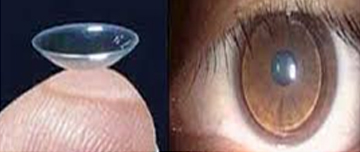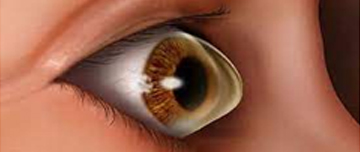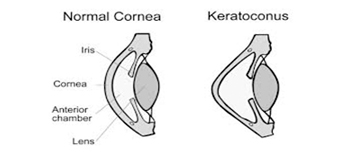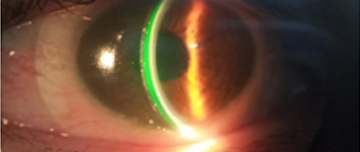RGP Contact Lens
- What is RGP contact lens?
The name RGP refers to Rigid Gas Permeable lens which is also known as Hard contact lens. These are usually made up of materials which allow higher amount of oxygen to pass through it to give comfort to use the lenses for longer hours. - Are RGP lenses better over Soft contact lenses?
Soft contact lenses are the ones which are routinely used to correct eye powers (plus and minus). However, there are some conditions in which RGP lenses score higher over the soft ones and better suited to give visual clarity, comfort and sustainability. - What are these used for?
RGP lenses are used for following reasons:
- Very high degree of myopia when the unaided vision is not good enough to handle soft contact lenses
- High degree of astigmatism or cylindrical power which is not correctable by soft contact lenses
- Keratoconus or corneal Ectasia
- Are RGP lenses safe to use on regular basis?

Yes, they are absolutely safe to use regularly as they meet the nutritional demand of the eye and also provides clear vision. However, they have to be removed after the prescribed timeframe of usage. - How long can RGP lenses be used at a stretch?
One can safely use them 12-14 hrs a day though it is always better to keep it within 12 hrs or as advised by your Contact Lens Specialist depending on the material used and the condition of the eye. - Can I sleep with my RGP contact lens?
No, they have to be removed before you go to sleep as otherwise it would increase the chance of infection in the eye or may harm different parts of the eye. - My lenses frequently come out of the eye. What to do?
There are chances that it may come out of the eye if the fitting is not appropriate or if there is any progression of corneal curvature due to certain conditions or if you rub your eyes vigorously. Please visit your Eye care professional at the earliest to figure out the exact cause. - How much do they cost?
It usually costs between Rs 5000 to 12000/- depending on the type, brand and material of the lenses. - How frequently are they replaced?
It usually lasts one year to two years, depending on the lens material. However, a visit to the clinic once in every six months, is always recommended. - Can they become cloudy at times?
Yes, the vision may become cloudy if there is too much of protein deposits on the lens for which sometimes these are sent to Labs to clear the deposits. - May I use tap water to clean the lenses?
No, that is not recommended as there could be contamination. It is always advised that you carry your lens kit along and to use the prescribed/recommended Multi-purpose cleaning solution only. - How can I get my prescription RGP lenses?
These are not dispensed over the counter as these are specially designed customized lenses to fit your need. You need to take an appointment for RGP trial and keep at least 2 hrs in hand as it takes dedicated chair time to fit RGP lenses, especially in Keratoconic eyes.
- What is Keratoconus?

It is a progressive, degenerative condition of the eye when cornea, the clear frontwindow of the eye, loses its normal round shape and thins and bulges out, resulting in distortion of vision. It usually gets detected in teens and then progresses over time. - What are the symptoms of Keratoconus?
a) Blurring or distortion of vision
b) Glare and halos around the light
c) Light sensitivity or photophobia
d) Rubbing and irritation in the eye
e) Frequent change of cylindrical glass power - May I go blind with Keratoconus?
No, it does not cause total blindness but if the condition is left untreated, it may lead to serious, irreversible impairment of vision. - What are the causes of Keratoconus?
The cause is yet to be revealed but there are some pre-disposing factors leading to this condition, like

a) Chronic eye allergy
b) Constant or habitual eye rubbing
c) Chronic lid inflammation
d) Family history. - Is Keratoconus painful?
It is not a painful condition unless it progresses to an end stage with Corneal Hydrops which causes pain and swelling of the lids.
- Can I wear glasses in Keratoconus?
Glasses can be prescribed in Keratoconus. But, it may not help you attain the best possible vision for which Customized Rigid Gas Permeable lenses may be prescribed. In cases of very advanced Keratoconus, Scleral or Semi-Scleral lenses with bigger diameter than usual RGP lenses, are given for better comfort, stability and visual rehabilitation. - Can I lead a normal life with Keratoconus?
Yes, you may lead a normal life with Keratoconus even though it is going to stay with you for life. You just need to visit your Eyecare Professional routinely and follow the instructions, as advised by them depending on the stage of keratoconus. - Can allergies cause Keratoconus?
Eye allergies are often associated with Keratoconus which are to be treated simultaneously to avoid exacerbation of the condition. They may go hand in hand but allergies alone do not cause Keratoconus. - How to fix the problem of Keratoconus?

In early to moderate cases of Keratoconus, customized RGP contact lenses are prescribed which gives very good vision. Spectacles can be prescribed as back up. Advanced cases may need surgical intervention, followed by RGP, Piggyback or Scleral lenses for visual rehabilitation. Timing of the surgery plays an important role in arresting the progression by strengthening the corneal tissue. - What is the most advanced treatment in Keratoconus?
The most advanced treatment in Keratoconus is Corneal Collagen Cross-linking surgery (C3R/CXL) which helps in strengthening the corneal tissues to prevent further weakening of it so that it can arrest the progression. - Is this a permanent cure to the problem?
No, it needs close monitoring as it may need to be repeated at times to get the desired results, depending on the response of the corneal tissue. - What are the side effects of cross linking?
There may be irritation, pain, redness and watering immediately after the surgery. Usually a soft bandage contact lens is placed over the cornea which is removed after one week.
- Do I need eye transplant surgery?
Corneal transplant surgery (Penetrating Keratoplasty/ DALK) is an elaborate procedure and is used if all other ways to tackle the condition fail.
- May I undergo Lasik treatment to get rid of glasses after being diagnosed with Keratoconus?
A Big NO. Keratoconus is a contra-indication for Lasik treatment. Therefore, if there is any suspicion of Keratoconus, no refractive procedure is advisable as there would be instability in refractive power of the eye and treatment of Keratoconus then becomes the highest priority. - Does high cylindrical power mean Keratoconus?
No, presence of high cylindrical power does not mean you have Keratoconus. We check all our patients on Slit-Lamp Biomicroscope along with Corneal Topography, to rule out any possibility of the disease.